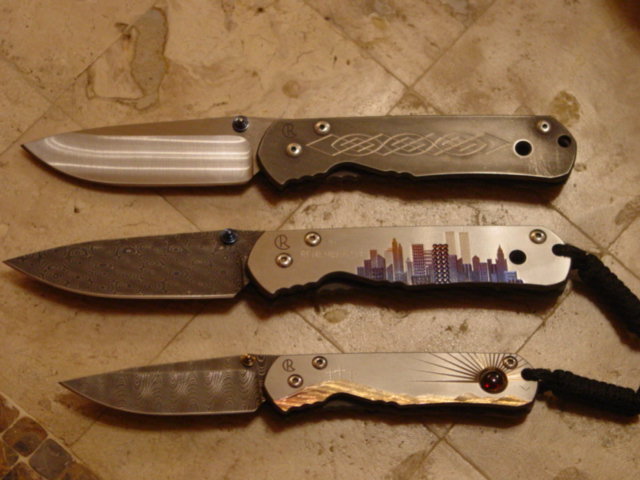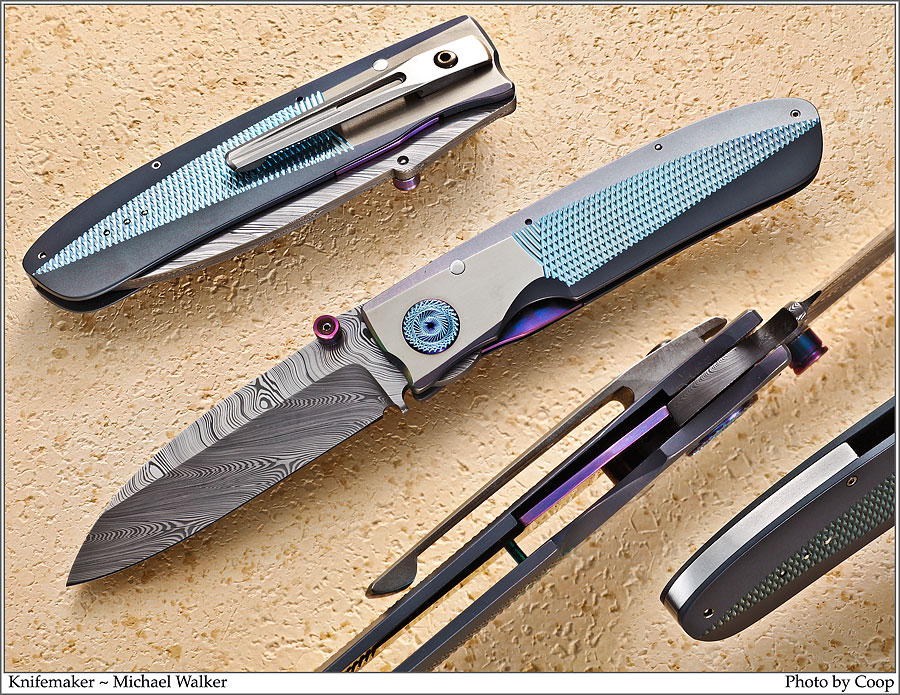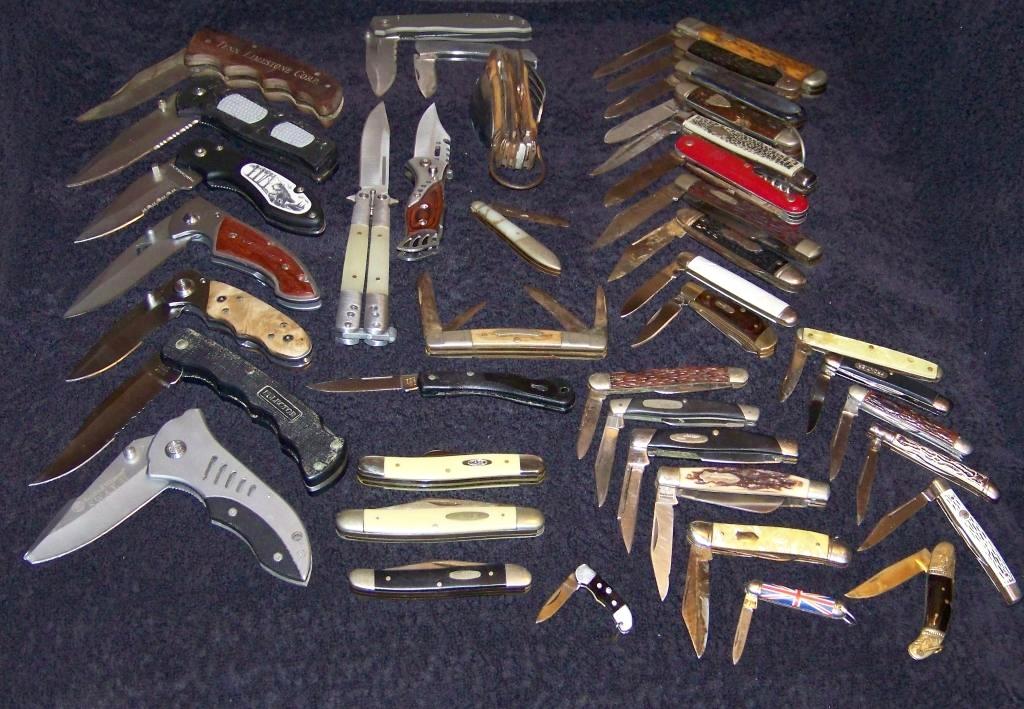|
Sebenza
The Sebenza is a folding pocket knife manufactured by Chris Reeve Knives of Boise, Idaho. It is constructed with a stainless steel blade and titanium handle. Its handle functions as the lock mechanism similar in concept to the Walker linerlock differing in that the handle itself forms the lock bar which holds the blade open. This mechanism was invented by Chris Reeve, and is called the Reeve Integral Lock (R.I.L). It is also commonly referred to as the Framelock, and is one of the most widely implemented locking systems in the folding knife industry, where lock strength and reliability is a product requirement. The name Sebenza is derived from the Zulu language, Zulu word meaning "Work," a tribute to Mr. Reeve's South African origins. Design and history There are currently two size models of the Sebenza 31, small and large. The Small 31 has a 2.99" (76.17mm) blade and the Large 31 has a 3.61" (91.69mm) blade. First introduced in 1990, the current basic model has a sand- ... [...More Info...] [...Related Items...] OR: [Wikipedia] [Google] [Baidu] |
Chris Reeve Knives
Chris Reeve Knives is an American knife manufacturing corporation with international sales and distribution headquartered in Boise, Idaho, that designs, develops, and sells folding pocket knives and fixed-blade knives. Its products include the Sebenza, Inkosi, Umnumzaan, TiLock, Mnandi folding knives, Impinda slip joint, and the Green Beret, Pacific, Professional Soldier, Nyala, and Sikayo fixed blade knives. Chris Reeve Knives' industry contributions include the Integral Lock, contributions to the blade steels CPM-S30V and CPM-S35VN, and has won Blade Magazine's Blade Show Manufacturing Quality Award 15 times. Their motto is ''Think Twice, Cut Once.'' History Chris Reeve Knives was founded as a sole proprietorship in January 1984, with Chris Reeve making custom knives in the single garage attached to the house in which Reeve was living in Durban, South Africa. In March 1989, Reeve and his wife Anne Reeve immigrated to the United States, and CRK commenced manufacturing in Bois ... [...More Info...] [...Related Items...] OR: [Wikipedia] [Google] [Baidu] |
Chris Reeve
Christopher Stanley Reeve (born December 4, 1953) is a South African-American knife maker, recognized as one of the most influential people in knife making history.Shackleford, Steve, Blade Magazine, “30 Most Influential People in Blade History”, October 2003, pages 92–98 Reeve founded Chris Reeve Knives (CRK) in 1984. In 2014, Reeve retired and was inducted into the Blade Magazine Hall of Fame in 2015. Background Christopher Stanley Reeve was born on December 4, 1953, in Durban, South Africa. His original vocation was that of tool and die making.Dyer, Keith, Magnum Magazine, “Blade-Maker Extraordinaire”, May 1983, pages 28–31 Reeve trained at the Pineware Manufacturing Company, serving a four-year tool- and die-making apprenticeship that finished in 1978. Reeve credits his experience in tool and die for developing his grinding skills and giving him the manufacturing and materials knowledge he needed to jumpstart him in professional knife making.Reeve, Anne, “C ... [...More Info...] [...Related Items...] OR: [Wikipedia] [Google] [Baidu] |
Walker Linerlock
The Linerlock is a locking mechanism for folding pocket knives. A Linerlock is a folding knife with a side-spring lock that can be opened and closed with one hand without repositioning the knife in the hand. The lock is self-adjusting for wear. The modern Linerlock traces its lineage to the late 19th century, but in the 1980s the design was improved by American custom knifemaker Michael Walker. History Linerlock knives have been around since the late 19th century. The Cattaraugus liner locking patent, 825,093 was issued on July 3, 1906. After 1923 when the patent expired, it was used by other manufacturers such as in the common military and lineman's issue two-blade electrician’s knife; the Camillus TL-29 for the locking screwdriver-stripper blade, until 2007 when the Camillus Cutlery Company went out of business. Walker refined and popularized the design, eventually securing a trademark for the name "Linerlock" in March 1990. Walker's improvement to the design was to facilit ... [...More Info...] [...Related Items...] OR: [Wikipedia] [Google] [Baidu] |
Damascus Steel
Damascus steel was the forged steel of the blades of swords smithed in the Near East from ingots of Wootz steel either imported from Southern India or made in production centres in Sri Lanka, or Khorasan, Iran. These swords are characterized by distinctive patterns of banding and mottling reminiscent of flowing water, sometimes in a "ladder" or "rose" pattern. Such blades were reputed to be tough, resistant to shattering, and capable of being honed to a sharp, resilient edge. Wootz (Indian), Pulad (Persian), Fuladh (Arabic), Bulat (Russian) and Bintie (Chinese) are all names for historical ultra-high carbon crucible steel typified by carbide segregation. "Wootz" is an erroneous transliteration of "utsa" or "fountain" in Sanskrit, however since 1794 it has been the primary word used to refer to historical hypereutectoid crucible steel. History Origins The origin of the name "Damascus Steel" is contentious: the Islamic scholars al-Kindi (full name Abu Ya'qub ibn Ishaq al-K ... [...More Info...] [...Related Items...] OR: [Wikipedia] [Google] [Baidu] |
Mechanical Hand Tools
Mechanical may refer to: Machine * Machine (mechanical), a system of mechanisms that shape the actuator input to achieve a specific application of output forces and movement * Mechanical calculator, a device used to perform the basic operations of arithmetic * Mechanical energy, the sum of potential energy and kinetic energy * Mechanical system, a system that manages the power of forces and movements to accomplish a task * Mechanism (engineering), a portion of a mechanical device Other * Mechanical (character), one of several characters in Shakespeare's ''A Midsummer Night's Dream'' * A kind of typeface in the VOX-ATypI classification See also * Machine, especially in opposition to an electronic item * ''Mechanical Animals'', the third full-length studio release by Marilyn Manson * Manufactured or artificial, especially in opposition to a biological or natural component * Automation, using machine decisions and processing instead of human * Mechanization, using machine labor inste ... [...More Info...] [...Related Items...] OR: [Wikipedia] [Google] [Baidu] |
Pocket Knives
A pocketknife is a knife with one or more blades that fold into the handle. They are also known as jackknives (jack-knife), folding knives, or may be referred to as a penknife, though a penknife may also be a specific kind of pocketknife. A typical blade length is . Pocketknives are versatile tools, and may be used for anything from whittling and Wood carving, woodcarving, to butchering Game (hunting), small game, gutting and filleting small fish, aiding in the preparation of tinder and kindling for fires, boring holes in soft material, to opening an envelope, cutting twine, slicing a piece of fruit or as a means of self-defense. Specialised designs are also used for mushroom hunting and gardening. Pocketknives designed for gardening include pruning knives, which are folding knives with long curved blades used for pruning, trimming cuttings, taking buds and preparing material for grafting. History The earliest known pocketknives date to at least the early Iron Age. A poc ... [...More Info...] [...Related Items...] OR: [Wikipedia] [Google] [Baidu] |
Blade Show
The Blade Show is an annual tradeshow for the cutlery industry. It is the largest event of its type in the world. The show is owned by Caribou Media Group and is hosted by Blade Magazine. The event has over 1,000 exhibitors and is the host for inductees into the annual Cutlery Hall of Fame. It also hosts the annual Blade HQ Balisong Competition, BladeSports International Cutting World Championships, Blade University, Knife of the Year Awards, and a variety of knifemaking classes and demos. The event takes place every year over the course of several days and brings in knifemakers and knife companies from all parts of world. History The first Blade Show was held in 1982 as the American Blade Convention and Show in Cincinnati, Ohio. The magazine who hosted the show was known as 'American Blade' at the time. In 1983 it became known as "The American Blade Collector's Show". In 1984 the name became "The Blade Super Show". In 1986 the show relocated to Knoxville, Tennessee. In 1988, the n ... [...More Info...] [...Related Items...] OR: [Wikipedia] [Google] [Baidu] |
Knifemakers' Guild
The Knifemakers' Guild is an American organization, based in Richfield, Utah, made up of knifemakers to promote custom knives, encourage ethical business practices, assist with technical aspects of knife making, and to sponsor knife shows. The Guild is composed of 300 knifemaker members and several thousand collectors, writers, and other investors as honorary members. History The idea for the Knifemakers' Guild came about at a Las Vegas, Nevada, gun show held at the Sahara Casino in February 1970. The actual founding occurred in November 1970 by A.G. Russell in Tulsa, Oklahoma. Charter members included Blackie Collins, Bob Loveless, John Nelson Cooper, and Dan Dennehy. Russell was made the first president with Loveless as the secretary. The current president is Gil Hibben, past presidents have included Jimmy Lile, Frank Centofante, D'Alton Holder, George Herron, Buster Warenski Buster Warenski (June 5, 1942 – July 31, 2005) was an American custom knifemaker from Kimberly, Ne ... [...More Info...] [...Related Items...] OR: [Wikipedia] [Google] [Baidu] |
Inkosi
Inkosi, otherwise appearing as Nkosi, is the Zulu and Xhosa for chieftain in Southern Africa. Inkosikazi is the equivalent term for a chieftess. An inkosi that has authority over several subordinate inkosis is traditionally referred to as an Inkosi Enkhulu (lit. "Great Chieftain"). This version of the title is typically translated as king in English. People who bear or once bore the title * Albert Lutuli * Mandla Mandela * George Matanzima * Kaiser Matanzima * Qaqambile Matanzima * Falo Mgudlwa Chief Falo kaMgudlwa (Falo son-of-Mgudlwa) was a Chief of AmaJumba Clan, of the amaThembu people near Qhumanco, Ngcobo. His household was based at Lucwecwe. Family The Mgudlwa line was established by Falo's father, the Chief Mgudlwa kaJumba ( ... * Mangosuthu Buthelezi See also * Induna {{DEFAULTSORT:Inkosi Zulu words and phrases African noble titles ... [...More Info...] [...Related Items...] OR: [Wikipedia] [Google] [Baidu] |
Loctite
Loctite is an American brand of adhesives, sealants, surface treatments, and other industrial chemicals that include acrylic, anaerobic, cyanoacrylate, epoxy, hot melt, silicone, urethane, and UV/light curing technologies. Loctite products are sold globally and are used in a variety of industrial and hobbyist applications. History In 1953, American Schwenkfelder professor Vernon K. Krieble developed anaerobic threadlocking adhesives in his basement laboratory at Trinity College in Hartford, Connecticut. Krieble’s company, American Sealants, founded the Loctite brand, which was promoted as ushering in a new era of mechanical reliability by eliminating the vibrational loosening of mechanical fasteners, a frequent cause of machine failure. In 1956, the name Loctite was chosen by Krieble’s daughter-in-law, Nancy Brayton Krieble. The Loctite sealant made its official public debut at a press conference at the University Club of New York on July 26 of that year. In 1963, Amer ... [...More Info...] [...Related Items...] OR: [Wikipedia] [Google] [Baidu] |


